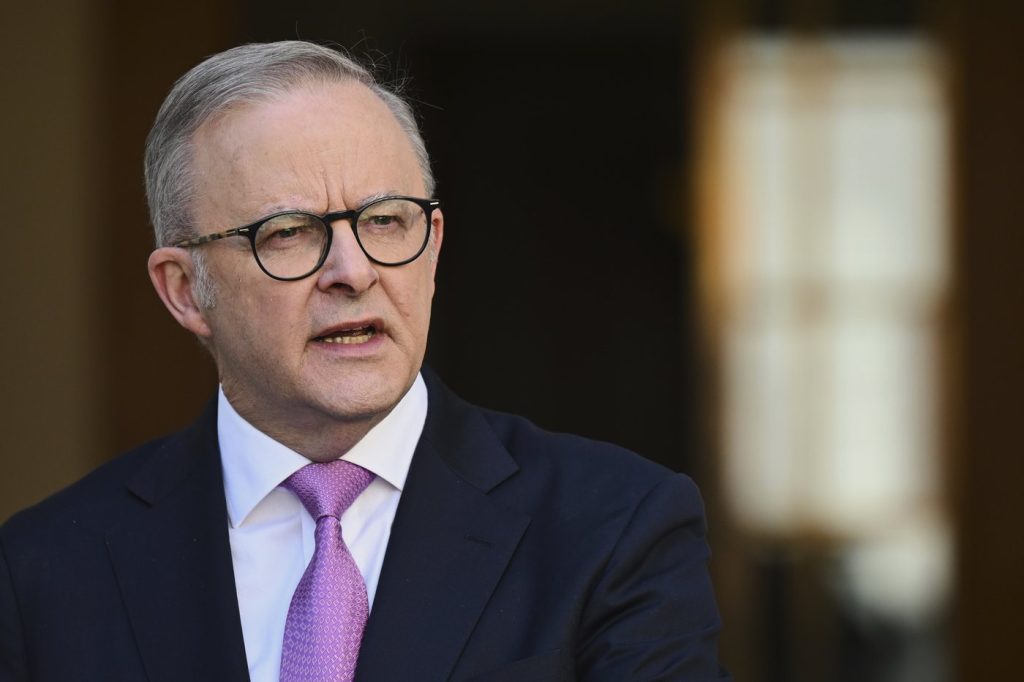MELBOURNE, Australia (AP) — Australian Prime Minister Anthony Albanese announced on Friday that reducing student debt would be the first legislative priority for his administration following its recent election victory. This election marked a significant moment in Australia’s political landscape, as the Baby Boomer generation was officially outnumbered by younger voters for the first time.
Addressing a gathering of center-left Labor Party lawmakers in Parliament House, Albanese emphasized the importance of the issue, highlighting the struggles faced by many young Australians, especially those burdened with student loans. The rising property prices and insufficient housing construction have made it increasingly difficult for this demographic to purchase their first homes, a concern that resonated strongly during the campaign.
In his remarks, Albanese stated that a bill aimed at reducing student debt by 20% would be introduced as the first piece of legislation when Parliament reconvenes in late July. He framed this initiative not only as a financial relief measure but also as a demonstration of the government's commitment to intergenerational equity.
Traditionally, the interests of the Baby Boomer generation, individuals born between World War II and 1964, have dominated Australian political discourse. However, the latest election results indicated a shift, with the Labor Party expected to secure 88 seats out of the 150 in the House of Representatives, significantly up from the 78 seats they held in the previous parliament. Conversely, the conservative opposition alliance is projected to win only 41 seats.
Albanese lauded the diversity within Labor's elected representatives, predicting that at least 57% of them would be women, reflecting the Australian population's gender distribution, which was recorded at 50.7% female in the last census of 2021. He noted the importance of this representation, stating, “I see people of different ethnicities, different backgrounds, different experiences, different faiths. I see a diverse group of people that are truly representative of our nation.”
Despite these developments, Albanese's government faced criticism for not including Attorney-General Mark Dreyfus, the highest-ranking Jewish member, and Industry and Science Minister Ed Husic, the most prominent Muslim in the Cabinet, in the new ministerial lineup. This change marked the first time since 2010 that an Australian government would be without a Jewish minister, raising concerns about representation within the Cabinet.
The selection of Cabinet ministers is influenced by party factions, which receive a proportional share of ministerial positions based on their strength within the government. While key figures such as Foreign Minister Penny Wong and Defense Minister Richard Marles retain their roles, Albanese has yet to finalize the remainder of the ministerial appointments.
During Friday’s meeting, the Labor lawmakers endorsed 30 appointments to the Cabinet and junior ministries. Health Minister Mark Butler indicated that Anne Aly, a junior minister, is expected to be elevated to Cabinet next week, suggesting a potential female Muslim replacement for Husic.
The absence of Husic from the new Cabinet has prompted reactions from community leaders, including Jamal Rifi, a representative of the Sydney Muslim community. Rifi urged Albanese to reconsider this decision, emphasizing the message conveyed to the constituents in southwestern Sydney, a region with a significant Muslim population, who had worked diligently for the government’s re-election. Husic has been a vocal critic regarding the ongoing conflict between Israel and Hamas, expressing strong sentiments about the humanitarian impact on Palestinians.











